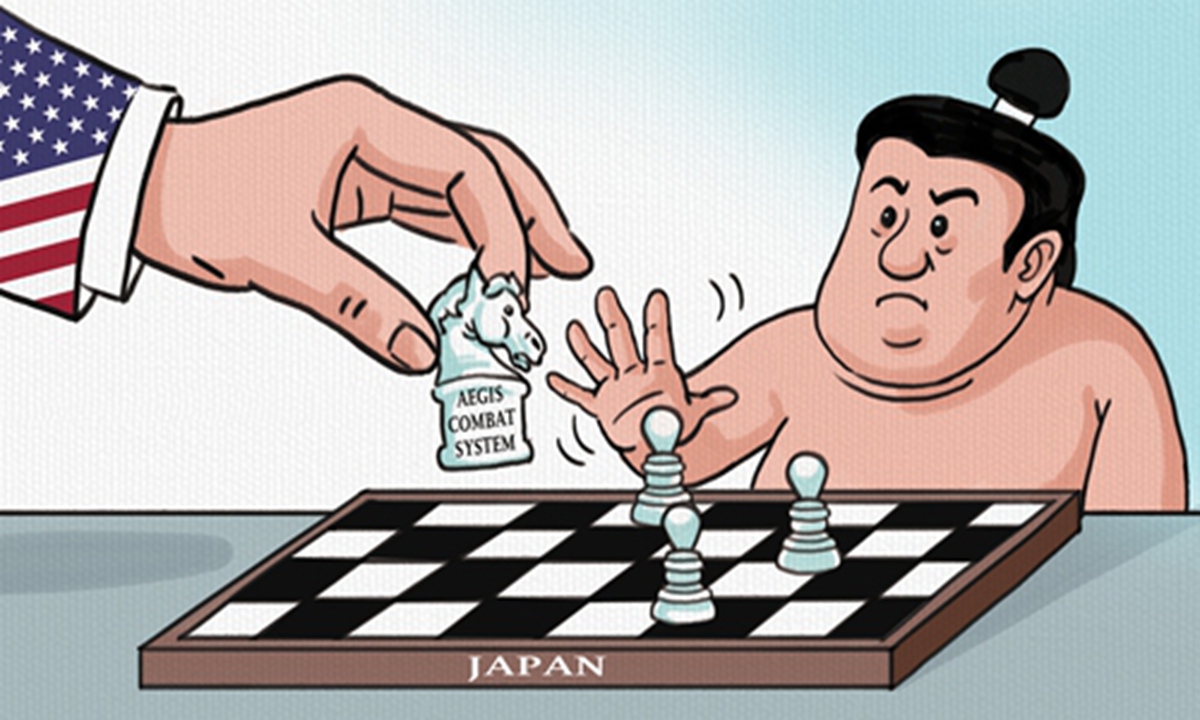Japan's plan for building anti-missile ships would undermine regional peace
By Du Wenlong Source: Global Times Published: 2020/9/8 0:09:05

Illustration: Liu Rui/GT
Tokyo has told Washington that building specialized ships to counter ballistic missiles is the most viable alternative to the scrapped plan to deploy land-based, US-developed Aegis Ashore systems, a Japanese government sources said on Saturday, Kyodo News reported.
Japan announced in June it would suspend the plan to deploy land-based Aegis Ashore systems due to cost and technical problems. There are several reasons why Japan says building specialized ships to counter ballistic missiles are the most viable alternative. The first is trying to fill the shortfall of an arms deal with the US as it canceled the previous plan to deploy Aegis Ashore systems.
Second, Tokyo hopes to reduce the sensitive nature of the project to avoid being targeted by many countries in the Asia-Pacific region. Judging from its name, building specialized ships to counter ballistic missiles seems to underline the defensive and lowering sensitivity. Seoul's plan to deploy Terminal High Altitude Area Defense in 2017 caused relations with many neighboring countries to deteriorate. Tokyo appears to have drawn a lesson from Seoul's experience.
Third, the effect of sea-based deployment would be better than land-based. Japan is surrounded by the sea and has to bear the possibility of being attacked by ballistic missiles from different directions. Sea-based deployment to counter ballistic missiles will increase its flexibility to deal with potential attacks.
Article 9 of the Japanese Constitution outlaws war as a mean to settle international disputes involving the state. The article requires, Japan to formally renounces the sovereign right of belligerency and aims for international peace based on justice and order. Building specialized ships to counter ballistic missiles does not contravene Article 9 on surface. Yet, these ships can be used for both offensive and defensive ends. It is determined by what type of missiles they use. The possibility that Japan would use offensive weapons on these ships cannot be ruled out. If that were to happen, Japan would violate Article 9.
There have been reports saying the US is considering deploying mid-range missiles on Japanese soil. Such a move will irritate Japan's neighboring countries including China, North Korea and Russia. By contrast, building specialized ships to counter ballistic missiles conveys the idea that Japan is only improving its defensive capability.
Japan's emphasis on building the ships to "counter ballistic missiles" is designed to provide cover for the US mid-range missile sites. If Japan approves the US' proposal to deploy mid-range missiles in Japanese territory, China, Russia, North Korea will firmly oppose the move. So Japan has to build ships to secure its safety if the US actually deploys missiles on Japanese soil.
Kyodo News reported Japan is to choose a new prime minister on September 16, which however won't influence on the implementation of the project. This is because whoever assumes office, bilateral ties between the US and Japan will not fundamentally change. Kyodo News also said Japanese outgoing Prime Minister Shinzo Abe is expected to issue a statement by mid-September to explain the government's position on missile defense. Abe is to set the basic national policy on missile defense for the successor.
It is quite possible that Japan will build these ships. Its low sensitivity will provoke less hostility from its neighboring countries. Japan also believes the existing Aegis ships are not adequate to enhance its offensive capability. Specialized ships to counter ballistic missiles can work as a supplementary.
If Japan does build these ships, Japan's offensive and operational capabilities will be enhanced. It could trigger an arms race of missiles. Against this backdrop, regional peace and security will be severely undermined.
The author is a military expert. opinion@globaltimes.com.cn
RELATED ARTICLES:
Posted in: VIEWPOINT,OTHER REGIONS